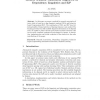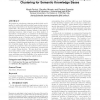15 search results - page 3 / 3 » Learning Logic Programs with Annotated Disjunctions |
SEMWEB
2010
Springer
13 years 3 months ago
2010
Springer
In this paper we present a method for semantic annotation of texts, which is based on a deep linguistic analysis (DLA) and Inductive Logic Programming (ILP). The combination of DLA...
ENTCS
2007
13 years 5 months ago
2007
Debugging by observing the evaluation of expressions and functions is a useful approach for finding bugs in lazy functional and functional logic programs. However, adding and rem...
ITS
2004
Springer
13 years 11 months ago
2004
Springer
Abstract. Intelligent tutoring systems are quite difficult and time intensive to develop. In this paper, we describe a method and set of software tools that ease the process of cog...
BMCBI
2006
13 years 5 months ago
2006
Background: Methods for predicting protein function directly from amino acid sequences are useful tools in the study of uncharacterised protein families and in comparative genomic...
CIKM
2007
Springer
13 years 12 months ago
2007
Springer
We present an evolutionary clustering method which can be applied to multi-relational knowledge bases storing resource annotations expressed in the standard languages for the Sema...


